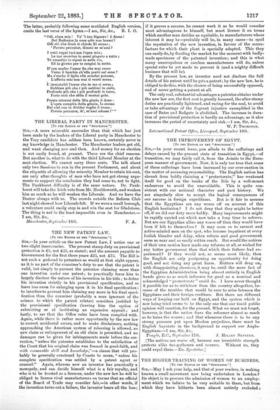THE IMPROVEMENT OF EGYPT.
[To THE EDITOR OF THE " EPECTATOR."] SIR,—In your recent issue, you allude to the sufferings and delays caused by the present state of transition in Egypt,—of transition, we may fairly call it, from the Asiatic to the Euro- pean manner of government. Now, it is only too true that some of these sufferings have been increased by our over-caution in the matter of assuming responsibility. The English nation has shrunk from boldly claiming a "protectorate," has weakened itself for good on the banks of the Nile by a well-meant endeavour to avoid the unavoidable. This is quite con- sistent with our national character and past history. We are singularly slow to accept the logical consequences of our success in foreign expeditions. But is it fair to assume that the Egyptians are any worse off on account of this English hesitation ? I do not deny that they might be better off, if we did our duty more boldly. Many improvements might be rapidly carried out which now take a long time to achieve. But are our Egyptian allies any worse off than they would have been if left to themselves ? It may seem so to earnest and active-minded men on the spot, who become impatient at every foolish blunder and delay, when reform and good government seem so near and so easily within reach. But would the natives of their own motion have made any referms at all, or wished for any better government than that which their fathers had ex- perienced? If they would not, as seems most likely, then the English are only postponing an opportunity for doing good, and not doing any great harm. Matters will drag on, with disappointing slowness, it may be, until the mere fact of the Egyptian Administration being almost entirely in English hands gives us as much influence for good as a nominal and acknowledged " protectorate " could do. I have never thought it possible for us to withdraw from the country altogether, be- cause of the troubles that would be sure to arise between the Egyptians and their foreign creditors. But there are different ways of keeping our hold on Egypt, and the system which is now being tried seems to be the only one that our timid public opinion will sanction, for the present. What we must not forget, however, is that the native fears the reformer almost as much as he hates the usurer ; and that whenever there is to be any strong pressure put upon Moslem prejudices, there must be English bayonets in the background to support our Anglo- Egyptians.—I am, Sir, &c., Temple, ac., September 17th. J. HILARY SKINNER.
[The natives are worse off, because our irresistible strength protects alike tax-gatherers and usurers. Without us, they could expel them.—En. Spectator.]


































 Previous page
Previous page